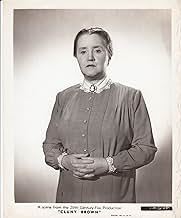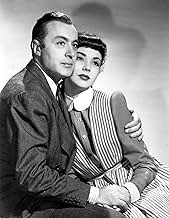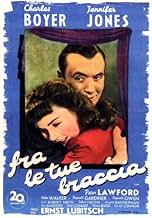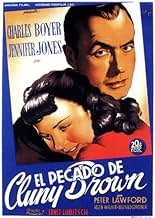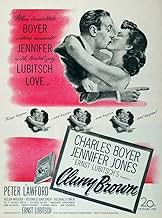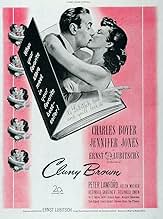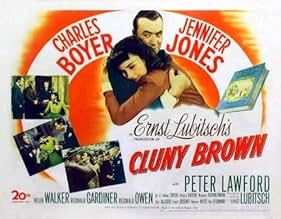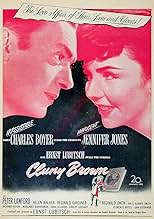VALUTAZIONE IMDb
7,4/10
4362
LA TUA VALUTAZIONE
Una cameriera dallo spirito libero e un rifugiato ceco sorprendono un villaggio inglese con i loro modi non convenzionali.Una cameriera dallo spirito libero e un rifugiato ceco sorprendono un villaggio inglese con i loro modi non convenzionali.Una cameriera dallo spirito libero e un rifugiato ceco sorprendono un villaggio inglese con i loro modi non convenzionali.
- Regia
- Sceneggiatura
- Star
- Premi
- 3 vittorie totali
C. Aubrey Smith
- Col. Charles Duff Graham
- (as Sir C. Aubrey Smith)
Norman Ainsley
- Mr. Tupham
- (non citato nei titoli originali)
Billy Bevan
- Uncle Arn Porritt
- (non citato nei titoli originali)
Whit Bissell
- Archie
- (non citato nei titoli originali)
Bette Rae Brown
- Girl at Party
- (non citato nei titoli originali)
Charles Coleman
- Constable Birkins
- (non citato nei titoli originali)
Recensioni in evidenza
Cluny Brown (1946)
"It's never too late for a cat." And this is the essence of the movie, a supposed satire on British manners pre-WWII, but more likely just a bit of delightful nonsense. The star for me is the delectable Jennifer Jones who is more than just a pretty decoration-she gives her role as a uninhibitted working class woman a kind of Audrey Hepburn freshness. Before Audrey Hepburn.
Charles Boyer is no doubt the most esteemed star here, but he's his usual self with a bit of forced charm. Director Lubitsch makes the whole scene quite delicious, so it's the big view that makes the small pieces click. (And this is what he is famous for, setting the European scene with a subtle, sharp eye.) There is humor here (it's a comedy, yes) but there is a kind of elegand disdain that is something more than that.
And it's beautifully filmed, by young (great) cinematographer Joe LaShelle.
What holds it all back for me is the writing, which is a kind of forced comedy, creating situations that are "made" for comedy. An awkward confrontation, an improbable entry of one character into another character's world. There is whispering and disbelief and nonchalance all mixed together in a way that is, in fact, lighthearted, but isn't as funny or bright as you would want.
And so the movie zips on, quite fun and lighthearted but always (for me) missing some basic gut humor or even a more trenchant critique of its subject, the British upper class. I did, I have to admit, love the ending, which was perhaps inevitable, but which pulled of a clever telling of the future of the leading characters. Fun, well done! And Jones is sublime even when she's goofy.
"It's never too late for a cat." And this is the essence of the movie, a supposed satire on British manners pre-WWII, but more likely just a bit of delightful nonsense. The star for me is the delectable Jennifer Jones who is more than just a pretty decoration-she gives her role as a uninhibitted working class woman a kind of Audrey Hepburn freshness. Before Audrey Hepburn.
Charles Boyer is no doubt the most esteemed star here, but he's his usual self with a bit of forced charm. Director Lubitsch makes the whole scene quite delicious, so it's the big view that makes the small pieces click. (And this is what he is famous for, setting the European scene with a subtle, sharp eye.) There is humor here (it's a comedy, yes) but there is a kind of elegand disdain that is something more than that.
And it's beautifully filmed, by young (great) cinematographer Joe LaShelle.
What holds it all back for me is the writing, which is a kind of forced comedy, creating situations that are "made" for comedy. An awkward confrontation, an improbable entry of one character into another character's world. There is whispering and disbelief and nonchalance all mixed together in a way that is, in fact, lighthearted, but isn't as funny or bright as you would want.
And so the movie zips on, quite fun and lighthearted but always (for me) missing some basic gut humor or even a more trenchant critique of its subject, the British upper class. I did, I have to admit, love the ending, which was perhaps inevitable, but which pulled of a clever telling of the future of the leading characters. Fun, well done! And Jones is sublime even when she's goofy.
The Lubitsch Touch is evident in this witty, intelligent film. Jennifer Jones shows a vivacity and humor she had never displayed before and would not again until her clever performance in "Beat The Devil". In one amazing scene where she cannot resist showing her wares as a Plumber (to the disdain of the other party guests) she gets to play a reaction to the debacle that is amazing in its combination of pathos and hilarity. Very interesting character actors including a very, very funny Una O'Connor (whose dialogue consists mainly of incessantly clearing her throat), the light as a feather and dead on playing of Margaret Bannerman, and also a chance to see Helen Walker. Charles Boyer plays with his customary light touch and is the anchor to this film, but finally it is Jennifer Jones' performance that takes one breath away and stays with you long after you've seen it.
Boy, here's a movie that is just crying out for a DVD release for its fans....and one with English subtitles on it. I would buy it immediately if it ever becomes available.
The attraction is simply Jennifer Jones doing what she does best: play a beautiful, sweet and innocent girl....the kind "you want to take home to momma!"
It must be all Jones that makes me desire to see this on DVD because (1) there really isn't much of a story here, which leads to some dry spots; (2) Charles Boyer's french accent is too tough to understand many times; (3) there is the usual mistaken-identity story which was so popular (and usually stupid) in old movies; (4) the cinematography isn't much; (5) most of the humor is so corny, it's stupid.
Yet, despite all the negatives above, this film is one I want to see again because Jones - "Cluny Brown" - plays one of the most likable, old-fashioned nice characters I've ever seen on film. It is as pretty as she ever looked and you'd be hard-pressed to find a sweeter more innocent character. She is just a pleasure to watch.
Rarely have I seen one person elevate a so-so movie to this degree.
The attraction is simply Jennifer Jones doing what she does best: play a beautiful, sweet and innocent girl....the kind "you want to take home to momma!"
It must be all Jones that makes me desire to see this on DVD because (1) there really isn't much of a story here, which leads to some dry spots; (2) Charles Boyer's french accent is too tough to understand many times; (3) there is the usual mistaken-identity story which was so popular (and usually stupid) in old movies; (4) the cinematography isn't much; (5) most of the humor is so corny, it's stupid.
Yet, despite all the negatives above, this film is one I want to see again because Jones - "Cluny Brown" - plays one of the most likable, old-fashioned nice characters I've ever seen on film. It is as pretty as she ever looked and you'd be hard-pressed to find a sweeter more innocent character. She is just a pleasure to watch.
Rarely have I seen one person elevate a so-so movie to this degree.
Ernest Lubitsch used the charms and abilities of his leads Charles Boyer and Jennifer Jones to get some maximum performances out of them and make his next to last film Cluny Brown a great success. I've not heard that Lubitsch had to contend with Jennifer's husband and Svengali David O. Selznick on the set, but it's a safe bet they clashed because Selznick could not help interjecting himself where his wife was concerned.
Jones is the daughter of English plumber Billy Bevan and the most interesting thing is that in this English setting her non-English speech pattern is perfectly acceptable even against Bevan's cockney accent. Jones was also perfectly acceptable in another English part in Love Letters and certainly got no criticism. The camera always loved Jennifer Jones and in parts like Cluny Brown as the girl next door she lit up the screen.
Boyer as often as not played a whole lot of European types not necessarily French. Here he's a Czech refugee over in the United Kingdom fleeing from Mr. Hitler. The film is set in Neville Chamberlain Great Britain and Boyer is one of many bringing unpleasant news to the British public.
After Bevan rescues Jones from Boyer and Reginald Gardiner Jones is placed as a maid at a country estate where she meets Boyer again. There should be some class barriers, but Boyer breaks them down and Jones is more than agreeable.
Lots of agreeable Lubitsch touches and a minimum of Selznick interference make Cluny Brown still a treat after over 60 years.
Jones is the daughter of English plumber Billy Bevan and the most interesting thing is that in this English setting her non-English speech pattern is perfectly acceptable even against Bevan's cockney accent. Jones was also perfectly acceptable in another English part in Love Letters and certainly got no criticism. The camera always loved Jennifer Jones and in parts like Cluny Brown as the girl next door she lit up the screen.
Boyer as often as not played a whole lot of European types not necessarily French. Here he's a Czech refugee over in the United Kingdom fleeing from Mr. Hitler. The film is set in Neville Chamberlain Great Britain and Boyer is one of many bringing unpleasant news to the British public.
After Bevan rescues Jones from Boyer and Reginald Gardiner Jones is placed as a maid at a country estate where she meets Boyer again. There should be some class barriers, but Boyer breaks them down and Jones is more than agreeable.
Lots of agreeable Lubitsch touches and a minimum of Selznick interference make Cluny Brown still a treat after over 60 years.
"Cluny Brown" had quite an impact on me when I saw part of it as a child. I'm sure my feelings had to do with the luminous beauty of Jennifer Jones and wanting to be just like her when I grew up.
Jones has the title role of an imaginative young woman who, being the niece of a plumber, doesn't mind picking up a hammer herself once in a while and having a good whack at the pipes. It gets her into some trouble at the apartment of Hilary Ames (Reginald Sinclair) when she arrives before a party to clear out his sink before his guests arrive.
There she meets Adam Belinski, a Czech academician who's on the run from Hitler. Well, that's who the very earnest Andrew Carmel (Peter Lawford) assumes he is...Belinski never actually says.
When her uncle finds Cluny drunk and on the couch at the Ames apartment, he puts her into service. She winds up working at the Carmel country estate, where Belinski comes to stay.
Attracted to her, he sets about aggravating the local pharmacist, Mr. Wilson (Richard Haydn) who is courting Cluny, and getting involved with Andrew's romance with Betty Cream (Helen Walker).
This is a very sweet, light comedy from Lubitsch that touches on not only the class system in England but the attitude of the upper class toward the impending war. As in the Fox film "This Above All," the upper class in "Cluny Brown" seems annoyed by the mere thought of war and hope the nonsense will just go away. As for Cluny, born to her class, she's expected to work and behave a certain way, though it isn't really her nature.
The performances are all very good, with Boyer a delight as Belinski, a character perhaps modeled on the Czech freedom fighter Jan Mazurek - though he basically doesn't act in danger or worried and manages to hit Andrew up for money. One is never really sure throughout the film what he's up to.
Richard Haydn is hilarious as Cluny's suitor Mr. Wilson, one of the best scenes taking place when he plays the harmonium for her and she all but swoons. As his mother, all Una O'Connor does is cough, but that's all she needs to do.
Playing opposite boyish Peter Lawford, Helen Walker seemed too old for the part of Betty. The other supporting players are all excellent, including Sara Allgood, Reginald Owen, and Margaret Bannerman.
David O. Selznick saw Jennifer Jones in his outer office, and it was love at first sight. It's easy to see why. She is radiant and spirited as Cluny, her vivid imagination shining through her eyes and smile. A wonderful presence - gentle, vulnerable, and guileless.
"Cluny Brown" isn't at the top of Lubitsch's best - it's uneven and doesn't have enough of a plot. It's entertaining nonetheless, and the ending is pure joy.
Jones has the title role of an imaginative young woman who, being the niece of a plumber, doesn't mind picking up a hammer herself once in a while and having a good whack at the pipes. It gets her into some trouble at the apartment of Hilary Ames (Reginald Sinclair) when she arrives before a party to clear out his sink before his guests arrive.
There she meets Adam Belinski, a Czech academician who's on the run from Hitler. Well, that's who the very earnest Andrew Carmel (Peter Lawford) assumes he is...Belinski never actually says.
When her uncle finds Cluny drunk and on the couch at the Ames apartment, he puts her into service. She winds up working at the Carmel country estate, where Belinski comes to stay.
Attracted to her, he sets about aggravating the local pharmacist, Mr. Wilson (Richard Haydn) who is courting Cluny, and getting involved with Andrew's romance with Betty Cream (Helen Walker).
This is a very sweet, light comedy from Lubitsch that touches on not only the class system in England but the attitude of the upper class toward the impending war. As in the Fox film "This Above All," the upper class in "Cluny Brown" seems annoyed by the mere thought of war and hope the nonsense will just go away. As for Cluny, born to her class, she's expected to work and behave a certain way, though it isn't really her nature.
The performances are all very good, with Boyer a delight as Belinski, a character perhaps modeled on the Czech freedom fighter Jan Mazurek - though he basically doesn't act in danger or worried and manages to hit Andrew up for money. One is never really sure throughout the film what he's up to.
Richard Haydn is hilarious as Cluny's suitor Mr. Wilson, one of the best scenes taking place when he plays the harmonium for her and she all but swoons. As his mother, all Una O'Connor does is cough, but that's all she needs to do.
Playing opposite boyish Peter Lawford, Helen Walker seemed too old for the part of Betty. The other supporting players are all excellent, including Sara Allgood, Reginald Owen, and Margaret Bannerman.
David O. Selznick saw Jennifer Jones in his outer office, and it was love at first sight. It's easy to see why. She is radiant and spirited as Cluny, her vivid imagination shining through her eyes and smile. A wonderful presence - gentle, vulnerable, and guileless.
"Cluny Brown" isn't at the top of Lubitsch's best - it's uneven and doesn't have enough of a plot. It's entertaining nonetheless, and the ending is pure joy.
Lo sapevi?
- QuizThis was the last film director Ernst Lubitsch completed himself. He died the following year during the filming of La signora in ermellino (1948).
- BlooperWhen Cluny and Adam and Hilary are in Hilary's living room, just after Cluny says "It's so wonderful to be a cat and read the Daily Mail," the boom mic can be seen in the mirror above Adam's head.
- Citazioni
Adam Belinski: In Hyde Park, for instance, some people like to feed nuts to the squirrels. But if it makes you happy to feed squirrels to the nuts, who am I to say, "nuts to the squirrels?"
- ConnessioniEdited into Lucy ed io: The Fox Hunt (1956)
I più visti
Accedi per valutare e creare un elenco di titoli salvati per ottenere consigli personalizzati
- How long is Cluny Brown?Powered by Alexa
Dettagli
Botteghino
- Lordo in tutto il mondo
- 17.155 USD
- Tempo di esecuzione1 ora 40 minuti
- Colore
- Proporzioni
- 1.37 : 1
Contribuisci a questa pagina
Suggerisci una modifica o aggiungi i contenuti mancanti

Divario superiore
By what name was Fra le tue braccia (1946) officially released in India in English?
Rispondi

